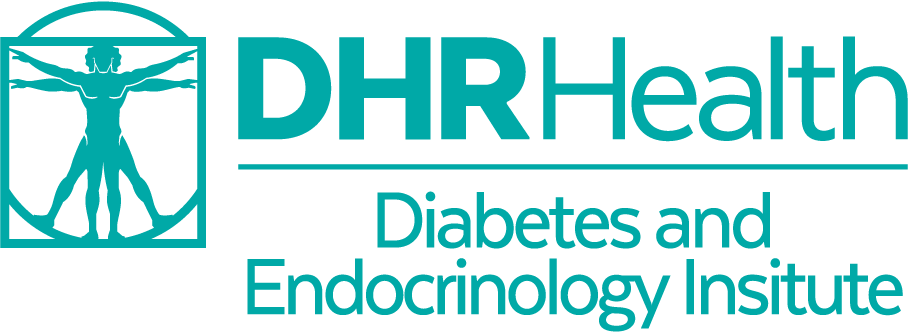DHR HEALTH DIABETES & ENDOCRINOLOGY INSTITUTE
Services
We would like to give you peace of mind knowing that your love ones are well taken care of. Here are some of the services we offer.
Your Team
We are proud to work with some of the best medical professionals in the country. Our team will provide you with the quality, compassionate care you need.
Contact Us
We want to ensure you have all of the information you need. To learn more about the services we offer, our hours and location, please feel free to contact us.

DHR Health Diabetes & Endocrinology Institute
DHR Health Diabetes & Endocrinology Institute, is a one-of-a-kind institution on the front lines of the world epidemic of diabetes — leading the battle to conquer diabetes in all of its forms through cutting-edge research and innovative approaches to clinical care and education.
DHR Health Diabetes & Endocrinology Institute takes a team approach in the management of diabetes with the patient being the most important person on the team. Our nurses, dietitians, and healthcare providers strive to provide high quality care at every patient encounter.
DHR Health Diabetes & Endocrinology Institute we are dedicated to our mission:
To improve the quality of life of persons affected by pre-diabetes or diabetes and to educate individuals, especially children and adolescents, with the knowledge and skills to prevent diabetes.
About Us
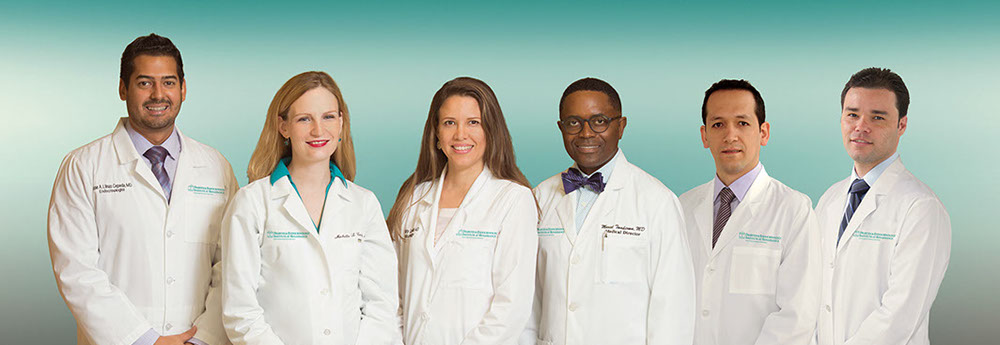
Diabetes
- Diabetes education services for people with type 1, type 2, and gestational diabetes.
- Diabetes medical nutrition therapy
- Insulin pump education
- Continuous glucose monitoring system
- On-staff licensed professional counselors and pharmacists
Endocrinology
- Bone/Calcium Disorder
- Hormone Disorders (male & female)
- Lipid Disorders
- Obesity & Metabolism
- Pituitary, Gonad, & Adrenal Disorder
- Thyroid Disorders
- Thyroid Fine Needle Aspiration
- Thyroid Ultrasounds
Services
What is diabetes?
Diabetes is a disease in which the body is unable to properly use and store glucose (a form of sugar). Glucose backs up in the bloodstream — causing one’s blood glucose (sometimes referred to as blood sugar) to rise too high.
There are two major types of diabetes. In type 1 (formerly called juvenile-onset or insulin-dependent) diabetes, the body completely stops producing any insulin, a hormone that enables the body to use glucose found in foods for energy. People with type 1 diabetes must take daily insulin injections. This form of diabetes usually develops in children or young adults, but can occur at any age.
Type 2 (formerly called adult-onset or non insulin-dependent) diabetes occurs when the body doesn't produce enough insulin and/or is unable to use insulin properly (insulin resistance). This form of diabetes is usually found in people who are over 40, overweight, and have a family history of diabetes, although today it is increasingly occurring in younger people, particularly adolescents.
How do people know if they have diabetes?
People with diabetes frequently experience certain symptoms. These include:
- excessive thirst
- frequent urination
- weight loss
- increased hunger
- blurry vision
- irritability
- tingling or numbness in the hands or feet
- frequent skin, bladder or gum infections
- wounds that don't heal
- extreme unexplained fatigue
In some cases, there are no symptoms — this happens at times with type 2 diabetes. In this case, people can live for months, even years without knowing they have the disease. This form of diabetes comes on so gradually that symptoms may not even be recognized.
Who gets diabetes?
Diabetes can occur in anyone. However, people who have close relatives with the disease are somewhat more likely to develop it. Other risk factors include obesity, high cholesterol, high blood pressure, and physical inactivity. The risk of developing diabetes also increases as people grow older. People who are over 40 and overweight are more likely to develop diabetes, although the incidence of type 2 diabetes in adolescents is growing. Diabetes is more common among Native Americans, African Americans, Hispanic Americans and Asian Americans/Pacific Islanders. Also, people who develop diabetes while pregnant (a condition called gestational diabetes) are more likely to develop type 2 diabetes later in life.
How is diabetes diagnosed?
Diabetes is diagnosed with a simple blood test. Ideally, you should have a blood test for diabetes every year at your annual medical exam if you are at risk. Risk factors include a family history of diabetes, being African American, Latino/Hispanic American, Asian American, Native American or Pacific Islander, or have a history of gestational diabetes.
How is diabetes treated?
There are certain things that everyone who has diabetes, whether type 1 or type 2, needs to do to be healthy. They need to have a meal (eating) plan. They need to pay attention to how much physical activity they engage in; physical activity can help the body use insulin better so it can convert glucose into energy for cells. Everyone with type 1 diabetes, and some people with type 2 diabetes, also need to take insulin injections. Some people with type 2 diabetes take pills called "oral agents" which help their bodies produce more insulin and/or use the insulin it is producing better. Some people with type 2 diabetes can manage their disease without medication by appropriate meal planning and adequate physical activity.
Everyone who has diabetes should be seen at least once every six months by a diabetes specialist. He or she should also be seen periodically by other members of a diabetes treatment team, including a diabetes nurse educator, and a dietitian who will help develop a meal plan for the individual. Ideally, one should also see an exercise physiologist for help in developing a physical activity plan, and, perhaps, a social worker, psychologist or other mental health professional for help with the stresses and challenges of living with a chronic disease. Everyone who has diabetes should have regular eye exams (once a year) by an ophthalmologist to make sure that any eye problems associated with diabetes are caught early on and are treated before they become serious.
Also, people with diabetes need to learn how to monitor their blood glucose. Daily testing will help determine how well their meal plan, activity plan, and medication are working to keep blood glucose levels in a normal range. The diabetes educators at the Joslin Diabetes Center can help!
What can you do to take control of your diabetes?
• Make healthy food choices; eat smaller portions and less fat, and spread carbohydrates (bread, fruit, milk) throughout the day.
• If you are overweight, try to lose some weight so you can better use insulin.
• See a dietitian for a meal plan that works for you.
• Increase physical activity. Aim for 30 minutes every day.
• Take medications as prescribed. Most people with type 2 diabetes need several medicines to control blood glucose; those with type 1 diabetes must take insulin.
• Check blood glucose regularly and discuss the results with your healthcare team.
What other problems can diabetes cause?
Your healthcare team will encourage you to follow your meal plan and exercise program, use your medications and monitor your blood glucose regularly to keep your blood glucose in as normal a range as possible as much of the time as possible. Why is this so important? Because poorly managed diabetes can lead to a host of long-term complications — among these are heart attack, stroke, blindness, kidney failure, and blood vessel disease that may require an amputation, nerve damage, and impotence in men.
Thankfully, a nationwide study completed over a 10-year period showed that if people keep their blood glucose as close to normal as possible, they can reduce their risk of developing some of these complications by 50 percent or more!
How can you prevent diabetes complications?
- Discuss your glucose monitoring, A1C, blood pressure and lipid results with your healthcare provider.
- Take your diabetes, blood pressure and lipid medications as prescribed.
- Have an annual dilated eye exam to prevent vision loss.
- Have an annual microalbumin urine test to check for kidney problems.
- Check your feet daily for cracks, sores and redness and report problems to your healthcare provider.
- Always have with you treatment for low blood glucose if you take medication that lowers your blood glucose.
- Stop smoking to prevent heart, eye and kidney disease.
- Get a flu shot every year.
- Wear medical identification in case of an emergency.
- Keep appointments with your provider.
- See your dentist twice a year.
Can diabetes by prevented?
Researchers hope to find one day find a cure for diabtes. Type 2 diabetes is the most common type of diabetes, yet we still do not understand it completely. Recent research does suggest, however, that there are some things one can do to prevent this form of diabetes. Studies show that lifestyle changes can prevent or delay the onset of type 2 diabetes in those adults who are at high risk of getting the disease. Modest weight loss (5-10% of body weight) and moderate physical activity (30 minutes a day) are recommended goals.
Frequently Asked Questions
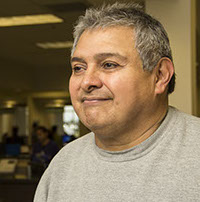
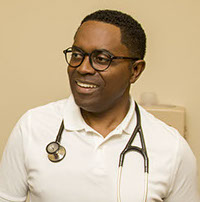
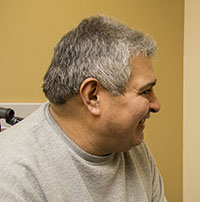
Marcel B. Twahirwa, M.D.
Staying strong in heart and in mind wins half the battle.
As a patient for over 5 years at DHR Health Diabetes & Endocrinology Institute, my support team of physicians, nurses, diabetes educators, dieticians, and pharmacists, has helped me accept and manage my diabetes.
Upon receiving my diagnosis of type 2 diabetes mellitus, I was in denial. I did not want to take ownership of my condition and couldn’t rationalize why this was happening to me. After realizing that this condition is one that I will have to live with for the rest of life, I went into panic mode. The many tasks that I would have to complete in order to manage my diabetes, such as checking my blood sugar daily, restricting my diet, and exercising more, all became overwhelming.
I had almost every single medical complication possible from not properly managing my diabetes. I have been treated for cataracts, glaucoma, cardiovascular disease, decreased kidney function, ulcers, and have also had one of my toes amputated.
" DHR Health Diabetes & Endocrinology Institute has helped me get back to a normal life."
When I began receiving treatment at DHR Health Diabetes & Endocrinology Institute, the first thing I noticed was the staff’s support and willingness to educate me about my condition. They helped me establish long-term goals, and provided me with the tools I needed to achieve them. I personally found the d-Life videos especially helpful, as they were a testimony of how others have managed to control their diabetes. The Diabetes & Endocrinology Institute at Renaissance also offers individual and group education classes that helped me become familiar with my day-to-day responsibilities to keep my condition under control.
Being treated at Diabetes & Endocrinology Institute at Renaissance has also provided me with the opportunity to be a participant in a research trial. I not only am receiving the most innovative treatments, and newest medications, but I am helping others and contributing to the advancement of diabetes care.
Diabetes & Endocrinology Institute at Renaissance has helped me get back to a normal life. By taking an active role in the management of my diabetes, I know I am much healthier today than I was the day I walked in here.
Alejandro Leal
Patient Testimonial
We'll be here for you when you need us
We hope you found all of the information that you needed. If you have any questions or if you would like to make an appointment, please call us and we will schedule one for you at your immediate convenience.
Edinburg Location
2609 Michael Angelo Drive, Edinburg, TX 78539
(956) 362-5650
Open Monday-Friday 8:00 AM – 5:00 PM
Edinburg Location
2821 Michael Angelo Dr. Suite 102 A, Edinburg, TX 78539
(956) 362-5650
Open Monday-Friday 8:00 AM – 5:00 PM
Mission Location
2121 Griffin Parkway Suite 17, Mission, TX 78572
(956) 362-5650
Open Monday- Thursday 8:00 AM – 5:00 PM
Weslaco Location
DHR Health Specialty Clinic
505 Angelita Dr., Ste. 14, Weslaco, TX 78599
(956) 854-4540
Open Wednesday 8:00 AM – 5:00 PM
Brownsville Location
DHR Health Specialty Clinic
4770 N. Expwy. 77/83, Ste. 305B
Brownsville, TX 78526
(956) 362-3715
Open Wednesday 8:00 AM – 5:00 PM
Rio Grande City Location
DHR Health Specialty Clinic
201 N. FM 3167, Suite 106
Rio Grande City, TX 78582
(956) 352-1431
Open Wednesday 8:00 AM – 5:00 PM
Contact Us
Doctors Hospital at Renaissance
5501 S. McColl Road, Edinburg, Texas 78539
(956) DOCTORS / (956) 362-8677
Diabetes & Endocrinology Institute at Renaissance at Renaissance / Doctors Hospital at Renaissance
Health System © 2016. All Rights Reserved.
